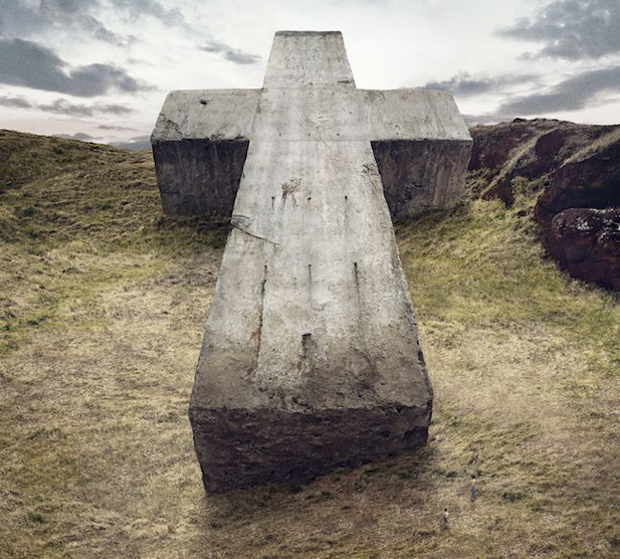You look up at the strange vehicle towering over you. Its doors open, smoke seeping out and obscuring your vision. You tentatively step into the light emanating from inside and sit down at the controls. The doors hiss shut, you feel the ground shifting beneath you, and the world begins to warp and dissolve outside the window.
First track, “Horsepower,” is simultaneously heralding a long-awaited return, and announcing a change that may take you by surprise: Justice’s second studio album, Audio, Video, Disco, is a time machine. It marks a departure from the conventional, albeit masterful, electro of debut †, and a move towards that age-old, larger-than-life genre, heavy metal. Like the record’s cover art, Gaspard Augé and Xavier de Rosnay have crash-landed in a different time; a time before electro was invented, a time when the hook of a chorus wasn’t provided by a synthesizer but by an electric guitar.
The synthesis works beautifully. From “Horsepower,” the duo blast into lead single “Civilization,” a song Led Zeppelin might have made if they had grown up listening to Daft Punk. Somehow, Justice manages to combine the present-day edge of electro with the mystical imagery of metal, making “Civilization” sound more old-fashioned than their previous vocal-heavy tracks from †, “DVNO” and “D.A.N.C.E,” but no less catchy. “Paralyzed and possessed by crusaders deceased,” howls guest-vocalist Ali Love, preparing the listener for a set of songs that readily admit to retrospective homage.
Whenever you make the mistake of thinking the album has settled on the sound it has been striving for, Justice presses your foot down, and the time machine travels back further still. “Ohio” is a love song to the music of the late sixties, echoing such classics as The Mamas & The Papas’ “California Dreamin’” and The Beatles’ “Because.” It’s one of the album’s highlights, managing to capture the same feeling of tainted innocence as the songs of that era did, but updating it to fit in with contemporary youth culture. “Canon” and its introduction, “Canon – Primo” take yet another step backwards, Justice’s blend of heavy metal and electro reaching its peak, conjuring images of fifty-foot druids trampling on the chillwave bands that emerged in their absence.
There is a slight lull midway through the album: “On’N’On,” “Brainvision” and “Parade” see the duo slip from the knife-edge they’ve been balancing on, and start to lean too heavily on metal. “Parade” is particularly frustrating – up until this point, the band have kept their Queen influence in check. Many parallels can be drawn between Audio, Video, Disco and Queen’s soundtrack for the movie Flash Gordon, but “Parade” steps too close for comfort, lifting the iconic drumbeat from one of rock’s greatest ever anthems, “We Will Rock You.” However, as if realising this mistake themselves, Gaspard Augé and Xavier de Rosnay launch straight back into their original, distinctive synthesis of electro and metal on “New Lands.” By the end of the track, you’ve arrived back in the present day, “Helix” and “Audio, Video, Disco” proving the duo still has a firm grasp on modern trends, modern equipment and club-crushing electro anthems.
Audio, Video, Disco does have its flaws, feeling over-confident and overblown at times, but ultimately it’s an enjoyable record; the duo’s bravado may get them into some sticky situations but its also what gives them charisma, and this record is certainly packed full of charisma. It may not be as game-changing or complete as †, but Audio, Video, Disco has the exact same energy, intrigue, ear for melody and air of defiance as the group’s glittering debut.

